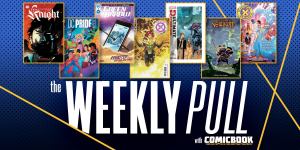
We live in the era of the modern superhero television series, largely due to the success of Arrow, it’s “realistic” take on the Green Arrow franchise.What started off as a grounded and violent look at Oliver Queen’s one-man quest to clean up corruption has become DC’s cornerstone for a unified DC Television Universe that includes The Flash, Legends of Tomorrow and Constantine.
With Arrow on a couple weeks break, here are five books that could quench your thirst for Oliver Queen and vigilante action:
Videos by ComicBook.com
Green Arrow: Year One

Green Arrow: Year One, inspired many of Arrow’s flashbacks, particularly during the first and second seasons. The Andy Diggle and Jock miniseries, followed Oliver Queen from his days as a partying playboy to his fateful marooning on Lian Yu. Like on Arrow, Oliver learns he’s not alone on the island, as he discovers a drug smuggling operation run by China White (who’s made several appearances on the show.) Green Arrow: Year One not only inspired Arrow‘s early flashback scenes, it also lent one of its creator’s names to the show. Show producers named both Diggle and his brother Andy after Green Arrow: Year One‘s writer Andy Diggle.
Green Arrow: The Kill Machine

The first volume of Jeff Lemire and Andrea Sorrentino’s critically acclaimed run, Green Arrow: The Kill Machine was the first “New 52” Green Arrow story to use some of Arrow‘s aesthetic and add some much needed danger and stakes to Oliver Queen’s life. The Kill Machine pitted Green Arrow against one of his father’s former business associates, who returned to ruin Queen both professionally and as an archer. With Queen Industries gone and his life in tatters, Oliver goes on the run with only a small support team backing him, trying to figure out what secrets his father hid in the past. The Kill Machine launched Lemire and Sorrentino’s multi-year run on Green Arrow, which culminated in “The Outsiders War“, which I’m convinced Arrow will one day use as a season long arc.
Green Arrow: The Longbow Hunters

If you’re looking for a “classic” Green Arrow series, look no further than The Longbow Hunters, a 1987 miniseries written and drawn by Mike Grell. The Longbow Hunters marked a dramatic change in Green Arrow’s attitude and modus operandi in the comics, as he abandoned his many trick arrows and starts hunting more traditional criminals as opposed to colorful supervillains. In addition to the change of focus, The Longbow Hunters also introduced Shado, a new archer with skills that equaled Oliver and her own deadly agenda. While not a direct adaptation of The Longbow Hunters, Arrow feels like a spiritual successor to the miniseries, with Oliver and his friends tackling many of the same issues and ethical obstacles as the ones faced by Green Arrow in the comic.
The Black Hood

Earlier this year, Archie Comics relaunched its line of superheroes, which largely had faded into obscurity after the Golden Age. One of its new series, The Black Hood, featured its own violent and dark take on corruption and justice that many fans of Arrow may find appealing. Greg Hettinger, a Philadelphia police officer, becomes the newest Black Hood after he accidentally kills his predecessor during a gunfight that also seriously scarred his face. Dealing with an addiction to painkillers, Hettinger discovers a local drug ring has ties with both the police force and the mayor’s office, leading to him donning the Black Hood in order to clean up corruption in the streets.
Akumetsu

While Japanese manga doesn’t usually delve into the superhero genre (with the exception of a few series like One Punch-Man), there are plenty of great series that delve into Arrow‘s themes of corruption, vigilante justice and an exploration of a strange new world. One of these series is Akumetsu, a manga starring a violent group of identical looking masked vigilantes out to end the immense corruption and unethical business practices that have pushed Japan to the brink of economic collapse. While each vigilante meets a deadly end after completing their mission, the group keeps pushing forward, seemingly undeterred by the loss of its members. Akumetsu fantastically blends the gritty vigilante genre with light science fiction, creating a tragically captivating and unforgettable read.





